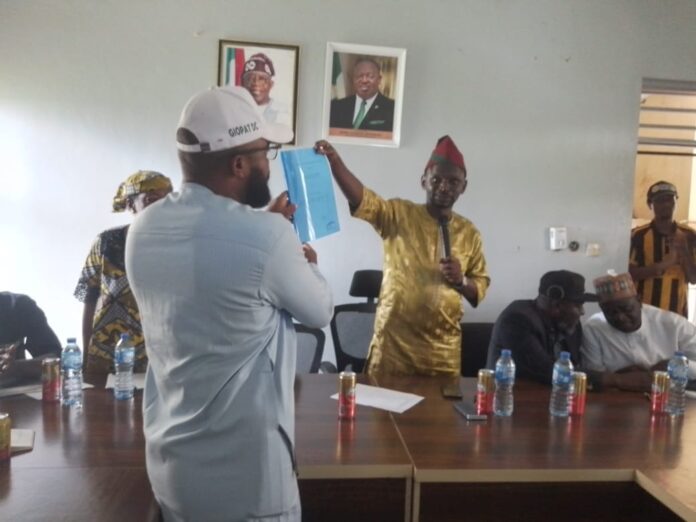The Plateau State Government has signed a Memorandum of Understanding (MOU) with GIOPAT DC Limited for the implementation of the Integrated Tricycle Ticketing Management System (ITTMS), aimed at improving security, regulating operations, and enhancing revenue collection.
Speaking at the stakeholders’ meeting on Thursday, Commissioner for Transport, Hon. Davou Gyang, said the ITTMS marks a turning point for transport regulation in the state. “This is not just about tickets; it is about creating order, ensuring accountability, and protecting both operators and passengers. The government is determined to move away from leakages and insecurity to a more transparent and secure system,” he stated.


Representing GIOPAT DC Limited, the company’s Liaison Officer explained the technical design of the system. “We are very grateful to the Honourable Commissioner and the Plateau State Government for the opportunity to partner in this groundbreaking initiative. Many people see this exercise only as levy collection, but that is just one part of it. The first and most important aspect is data collection, followed by the deployment of QR codes for identification and security. The ITTMS will provide a digital identity for every registered tricycle. With it, we can track revenue in real-time, curb multiple taxation, and also strengthen security since every operator will be documented,” he said, assuring stakeholders of seamless deployment.

Local government chairmen gave mixed responses: Hon. Silas Dung of Jos South endorsed and signed the MOU, pledging security cover for smooth implementation.
“I am indeed very glad to be here. For me, safety is more important than money. We must be alive before we can spend money. That is why I welcome this initiative, because it prioritizes safety, orderliness, and accountability in our transport system. It is natural that whenever government introduces a new policy, there will be resistance. But over time, people adjust and see the benefits. I want to assure you that Jos South is fully committed. I have appended my signature to the MOU on behalf of the local government, which demonstrates our readiness to support the state government and our partners. I have also directed all security heads in Jos South to give full cover and protection to those involved in this noble initiative. However, anyone doing business outside the law within our local government will be dealt with accordingly. As I always say, no two individuals — not even twins — develop at the same pace. Each local government will come on board at its own time, but within the framework of the law. For Jos South, we are ready and committed.”


While Hon. John Kyoro of Jos North raised legal and community concerns, requesting more time before full adoption in his area.
“What we are doing here today is noble, progressive, and very much welcome. The drive to sanitize Plateau State through innovation deserves commendation. However, for us in Jos North, there are legal and social issues that must be resolved before we can fully participate. When I assumed office in October last year, I met an existing MOU and contract on tricycle revenue collection that is still running. As a lawyer and a law-abiding citizen, I cannot set aside that agreement midway.On the issue of digitization, data collection, and security, we have no objection. The initiative can go ahead. But on revenue generation, we must wait for the current arrangement to expire before joining fully. Another challenge we face in Jos North is the lack of trust and acceptance of the implementing partner by our people. I have engaged with my community, and the resistance is strong. We need more time to sensitize them so that they can embrace this innovation.”

In his remarks Mr. Elisha Dasen, representing the Plateau State Internal Revenue Service (PSIRS), highlighted the revenue benefits. “The old system has left gaps that were exploited, but this MOU ensures a more centralized and accountable process. Every kobo collected will now be traceable,” he emphasized.


Elder Markus Yakubu Jatau Plateau state chairman Tricycle Road Union of Nigeria (TRUN), Representing all the tricycle union in Plateau state expressed optimism about the project. He said: “The nucleus of this meeting is the tricycle organization. Without our presence, the business of the day would not be complete. This issue has lingered for a very long time because the digital system was something new and unfamiliar to us. At first, it created friction, but as we engaged with the Ministry of Transport and GIOPAT DC, we came to understand its value. They have not come to displace us, but to add value to what we are doing. Anyone adding value to your work deserves applause and seriousness. At some point, people claimed we had sold the union to the government and service providers, but that is not true. We only saw the wisdom of submitting to this new process so that tricycle operators can be part of a transparent and structured revenue platform”
CSB Ajah Fidelis Ezekiel, representing the Plateau State Commissioner of Police, CP Emmanuel Olugbemiga Adesina, said “Crime has become so sophisticated these days, and this initiative by the Ministry of Transport will go a long way in addressing the misuse of legitimate means of livelihood, such as tricycles, for criminal activities. I want to assure you that the Plateau State Police Command will fully support this program to ensure it sees the light of day”


Representing the FRSC CRC Felix Bwoi of the Federal Road Safety Corps (FRSC) Plateau state sector command Jos said the digital system would help fight sophisticated crime and improve road safety. “I must say that I am very delighted that we are moving from analog to digital in most of our processes. Crime is becoming increasingly sophisticated, and the only way to combat it is to also get sophisticated in our approach. We in the FRSC are always on the road, and personally, one of the things I do as a precaution is to always take down the number of any tricycle I board, no matter the hour. This is a habit I encourage for safety and accountability. I want to plead with the Commissioner that as we continue to introduce new processes like this, it is important that we engage with one another from time to time. Even when the process is ongoing, if there are challenges, we should come back together to resolve them. That said, let us embrace technology fully. There is no way we can continue clamoring for change without taking the bold steps required to make it happen.”
In closing, the Permanent Secretary of the Ministry of Transport assured all parties of smooth implementation. “The ITTMS implementation process will involve continuous engagement with stakeholders.” she stressed.
The meeting ended with the official presentation of the signed MOU, which participants described as a bold step toward restoring order in tricycle operations across Plateau State.


